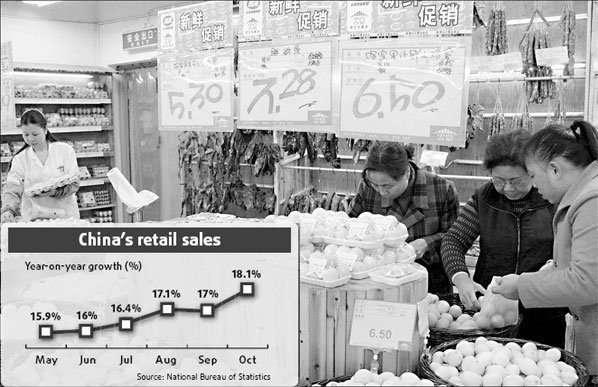Consumer spending a big GDP factor: NBS

When the National Bureau of Statistics (NBS) in October released its consumption figures for the first three quarters, people were surprised to discover that consumers are playing an ever-important role in the growth of the economy.
The latest figures for October reinforced this role as retail sales continued to go up.
Still, China needs to make some systematic changes if it is to sustain this trend, analysts said.
China's retail sales grew by 15.9 percent for the first nine months year-on-year. Growth for September was 17 percent.
Retail sales accelerated in October to 18.1 percent, pushing up the January-October growth to 16.1 percent.
It was a rate that China had not achieved in a decade, giving the public and economists confidence in the more balanced growth of China's economy, driven by investment, exports and consumption.
Consumption had contributed more than foreign demand to China's economic growth, Li Xiaochao, spokesman for the NBS, said at the release of macroeconomic statistics for the first three quarters last month.
Consumption contributed 37 percent of gross domestic product growth while foreign demand, or net exports, accounted for 21.4 percent, according to Li. The remaining 41.6 percent was made by investment.
This goes against the general impression that investment and exports are paramount forces driving the economy and has aroused doubt as to its reliability.
While exports are growing, imports are increasing at a faster pace, narrowing the gap and leading to shrinking net exports, according to Hua Min, Fudan University's Institute of World Economy.
In September, China's exports increased by 30.6 percent year-on-year while imports grew by 22 percent. In October, the growth rates were 22.3 percent and 25.5 percent respectively, indicating accelerated imports growth.
Some economists have offered a similar scenario to that of the NBS regarding the share of consumption, investment and foreign demand in economic growth.
Stephen Green, senior economist with Standard Chartered Bank (Asia), said: "We think net exports will contribute about 26 percent of the 11.5 percent (GDP) growth (in the first three quarters), according to our very provisional calculations ... (and) we think investment will contribute about 44 percent of the growth this year." That will leave consumption to contribute the remaining 30 percent to the growth.
"It is an illusion that China does not consume," Green told China Daily.
"It's just that its share of the growth is small, especially compared with investment."
Despite the difference in the exact proportion of consumption to economic growth, consumption does have more weight than net exports.
"This is a healthy development trend," Shi Jianhuai, an economist with Peking University's School of Economics, said.
"We cannot depend on foreign demand (for economic growth) in such a big economy as China."
It will incur trade frictions if China continues to rely on exports to drive economic growth, he said.
China's GDP reached 21.09 trillion yuan last year, increasing by 11.1 percent over the previous year. It contributed to 13.8 percent of world economic growth during the 2003-05 period, becoming the second largest contributor following the US, which contributed 29.8 percent, according to NBS calculations based on World Bank statistics.
Meanwhile, China has suffered from frequent anti-dumping charges in recent years and is under pressure to revalue the yuan to reduce its trade surplus.
"The sound growth of retail sales is expected to continue," Shi said.
As the value of the yuan rises, which will reduce exports, China may gradually shift its focus of growth to domestic demand, he said.
Shen Minggao, an economist with Citigroup in Beijing, agreed: "We continue to expect the government to introduce more consumption-friendly policies (such as an individual income tax cuts and a functioning social security system) to escalate the real growth rate of consumption in the future."
But challenges lie ahead. Consumption will continue to grow, but only slowly, analysts said, because the public are still bothered by spending pressures like social security, health, education and housing. With those uncertainties, they prefer to save rather than spend.
China remains a developing country with a relatively low level of income, which cannot provide a strong back-up for consumption, Fudan University's Hua said.
Moreover, the government has yet to provide adequate public services, such as education and health, and people prefer to save more in anticipation of rising future expenditure, he said.
"It is better for the government to provide more public services to lower their expectations about future spending increases," he said.
The government said it was trying to redress these problems by, for example, building more low-priced and public housing for the poor to rent.
The widening income gap is another factor that may curb consumption increases as a large proportion of the population is weak in spending, he said.
Official figures have pointed to this widening gap. In 2006, rural residents earned about one-third of the income earned by urban residents.
The nation may also consider giving priority to the development of labor-intensive industries, which will ease the gap, Hua proposed. The capital- and knowledge-intensive hi-tech industries do not accommodate much labor.
"Labor-intensive industries may be a better choice for China at the current stage," he said.
(China Daily 12/11/2007 page15)














